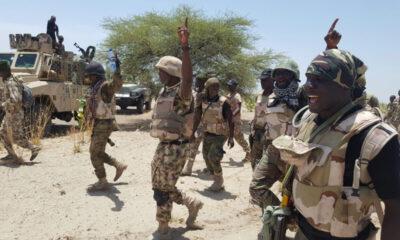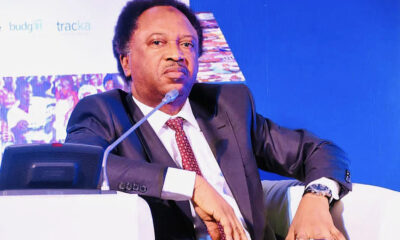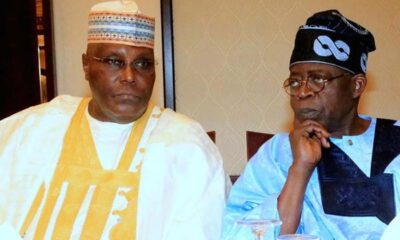metro
IPOB protests move to name Second Niger Bridge after Buhari
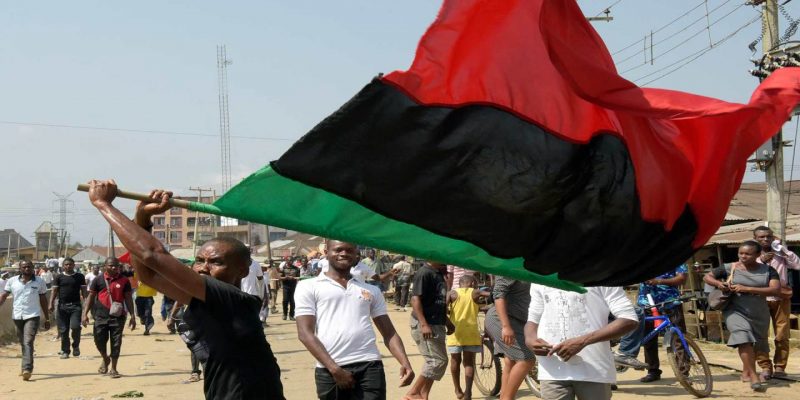
The Indigenous People of Biafra are protesting the move to name the second River Niger Bridge after the President, Major General Muhammadu Buhari (retd.).
The group, in a statement on Monday by its Media and Publicity Secretary, Emma Powerful, said it rejects naming the bridge after Buhari, “because he came to power and completely sidelined its people.”
The group claimed that under Buhari’s watch, South-East youths have been slaughtered by security agents with reckless abandon.
IPOB said the bridge should rather be called ‘Achuzie Bridge” or any other accomplished Igbo patriots, adding that no Igboman has been named after any big project in the North.
The group said, “Under his watch, terrorists masquerading as Fulani herdsmen have invaded our communities killing innocent men and women after destroying our farms with their cows.”
The group also debunked the allegation by the Minister of Works, Babatunde Fashola, that IPOB disturbed the construction of the second Niger Bridge.
It said, “This is another lie from the pit of hell. We want to challenge Fashola to substantiate his claims. Did IPOB in any way physically interfere with the construction of the bridge by either directly or indirectly hindering any worker either foreign or local handling the project?
READ ALSO:
- Drug War: FG approves N1bn for eye lie detector, goggle for NDLEA
- Putin demands Mariupol surrender to end shelling
- JUST IN: Benue Residents Gunned Down In Fresh Attack
“Fashola should know that if not for IPOB that has ensured security in the South East, the workers of Julius Berger would have run away from the site a long time ago. If the second Niger Bridge is being done in the North, Boko Haram, Ansaru, ISWAP, and the pampered bandits would have chased them away. That shows them that South East is more peaceful than the North.”
It also stated that “sycophants” in the Buhari administration derive joy in calling IPOB names to deceive the President.
The statement read in part, “South East has more credible names and more important persons who the Federal Government can name the second Niger bridge after. We have a galaxy of accomplished Africans like Chief Chinua Achebe, Chu Okongwu, Cyprain Ekwensi, Alexander Ekwueme, Chief Michael Okpara, Dr. Akanu Ibiam, Mbonu Ojike, Chief Kenneth Dike, Eni Njoku, Dora Akunyili, Dr Sam Mbakwe, Achuzie, Phillips Efiong and the living legend Chief Amaechi Mbazuruike
“All these names mentioned above are eminently qualified for second Niger Bridge to be named after them. The Second Niger Bridge was awarded in 1979 by the Shehu Shagari regime and since then, no administration found it worthy to execute it but IPOB agitation for self-determination pushed this APC administration to reluctantly embark on its construction using the funds past Nigerian politicians looted and starched away in Europe.
“We are aware of the condition given by a certain European country that they will only release stolen funds starched away in their country if the funds will be channeled towards the construction of the Second Niger Bridge. This is what compelled the Nigerian government to embark on the Bridge project not out of love for the Igbo people of Biafra. We reject naming the bridge after Buhari when we have other better names.”
PUNCH
metro
50% fare slash: Luxury bus owners increase trips as more travellers throng parks
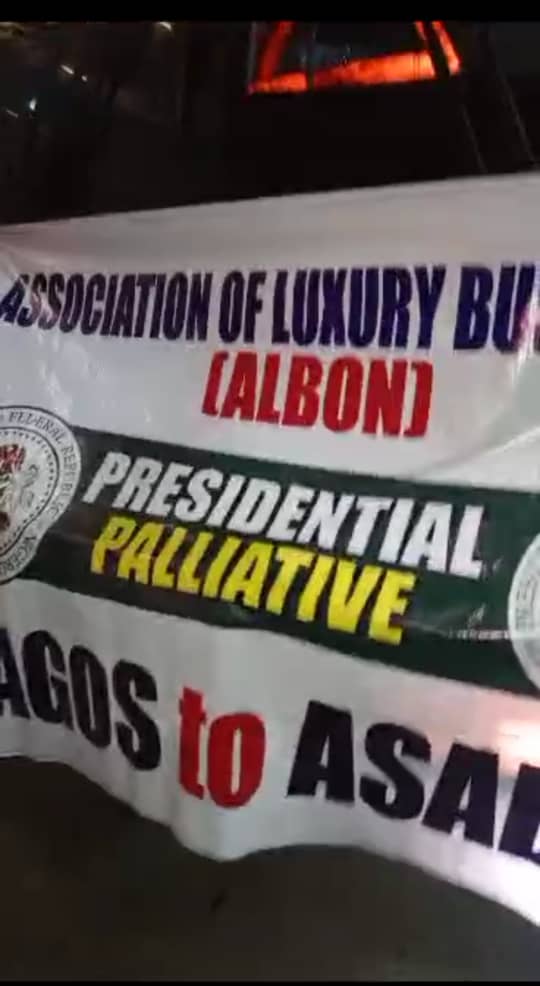
50% fare slash: Luxury bus owners increase trips as more travellers throng parks
More travellers heading to their country homes for the yuletide and end-of-the-year festivities have thronged luxury bus parks especially in Lagos to enjoy the Federal Government’s 50 percent fare slash offered on inter-state travels.
In response to this, the Association of Luxury Bus Owners of Nigeria (ALBON) has announced an increase in the number of scheduled trips on the Lagos-South East and Lagos-South South routes which will last until the end of the Christmas/New Year season.
This, it stated, was in response to the complaints of insufficient capacity to address the upsurge in the number of passengers on the affected routes.
The 50 percent fare slash on inter-state travels was last week approved by President Bola Tinubu for the Yuletide season.
A press statement by ALBON President, Mr. Nonso Ubajaka, and the Honorary Secretary, Mr. Frank Nneji, obtained on Monday disclosed that the Lagos-South-East and Lagos-South South routes had been witnessing an unprecedented increase in passengers since the commencement of the Presidential palliative.
The statement said there had been a sharp rise in the frequency of luxury bus departures from the popular Terminal 1 inter-state public motor park at Oshodi in Lagos as Lagosians were determined to take advantage of President Tinubu’s 50 percent fare palliative to travel to various destinations for the Yuletide season.
At the well lit Terminal 1 on Saturday, December 28, it was discovered that more people preferred to travel with the night buses as passengers thronged the various luxury bus transport companies’ booths to obtain their tickets at half the current fares.
A huge crowd of passengers was reported at the Oshodi Transport Interchange. They queued to obtain the rebate tickets even as others positioned their luggages for loading ahead of boarding.
The buses offering the special fares bore banners with bold inscriptions informing travellers that the gesture was a “Presidential Palliative” passed through the luxury bus owners umbrella body.
Despite large presence of intending passengers at the terminal, there was no stampede or breakdown of law and order as earlier reported by some online fake news platforms.
Checks at the various booths even on Sunday morning showed that a discounted fare of N23,500, which is half of the current N47,000 was being collected from the intending passengers for trips to eastern destinations like Onitsha, Owerri and Umuahia.
The high demand for the cheaper tickets has led to a situation where intending travellers throng the terminal hours ahead of night departures, while many others spend the night there to be able to pay for the discounted fare and board the early morning buses.
Some of the member-companies of the Association of the Luxury Bus Association of Nigeria (ALBON) seen selling the rebate tickets at the terminal are Evergreen Express, Okeyson Transport, Ifeanyichukwu Transport, Izuchukwu Transport, God Bless Ezenwata and Gobison Transport.
Just before departure on Saturday night, some of the passengers on board an Evergreen luxury bus going to Aba who paid N23,500 each, expressed their gratitude to President Tinubu for the fare palliative.
One of them said, ”This is the best Christmas gift anyone can get. I had given up hope of travelling home this season due to the high fares until I heard that the luxury bus transporters are partnering with the Federal Government to sell tickets at half the prices.”
Similarly, some excited Aba-bound passengers on board an Okeyson luxury bus confirmed that they benefited from the 50 percent discount, and thanked the President for subsidising Christmas season travels through the luxury bus transporters.
While an Izu Chukwu bus was seen departing to Asaba, another one belonging to Ezenwata was seen boarding Aba passengers all of whom were visibly excited that they could benefit from the “Tinubu’s palliative.”
Expressing their gratitude to the Federal Government for relieving them of the burden of high transport fares at a time of economic difficulties in Nigeria, most of them appealed for an extension of the January 5, 2025 end date, even as others hope for a similar gesture during the 2025 Christmas season.
“I am happy that I am travelling with my children with the 50 percent tickets. The President has done well, and pray he does it again next Christmas, so that poor people can travel home to meet their relations,” said a Gobison passenger, who disclosed that he and his family were also beneficiaries in 2023.
The leadership of ALBON last week commended President Tinubu for approving the subsidy on Yuletide trips.
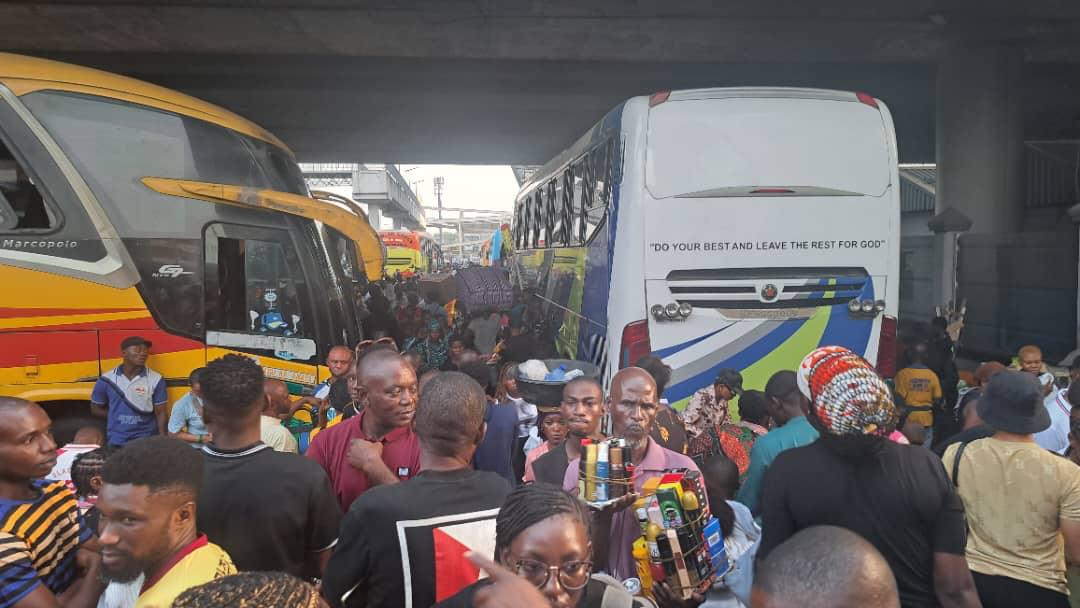
metro
Abducted 7-year-old girl rescued in Ogun, kidnapper arrested

Abducted 7-year-old girl rescued in Ogun, kidnapper arrested
A seven-year-old girl identified as Mercy Akande, who was abducted recently at Ado-Odo/Ota Local Government Area (LGA) of Ogun State has been rescued by the police.
Her abductor was also arrested in the operation by the anti-kidnapping team of Ogun State Police Command
In a statement in Ota on Sunday, Ogun Police Command’s spokesperson, SP Omolola Odutola, said the girl was rescued at Ayetoro Town in Ogun.
READ ALSO:
Odutola said the girl was rescued by the Police anti-kidnapping team, led by the Commissioner of Police, Lanre Ogunlowo.
“The suspects who abducted the innocent girl were also arrested in the course of rescuing the victim,” she said.
The Police Public Relations Officer (PPRO) said the suspects, while holding the girl captive, had demanded for ransom from the parents.
She however gave no further information on the suspects or the ransom being demanded.
Abducted 7-year-old girl rescued in Ogun, kidnapper arrested
(NAN)
metro
Nigeria gets World Bank $1.5bn loan

Nigeria gets World Bank $1.5bn loan
The World Bank has disbursed a $1.5 billion loan to Nigeria under the Reforms for Economic Stabilisation to Enable Transformation (RESET) Development Policy Financing initiative.
The loan, approved on June 13, 2024, was released in record time following Nigeria’s implementation of critical reforms, including the removal of fuel subsidies and comprehensive tax policies.
This fast disbursement contrasts with other loan programmes, which typically experience delays due to slow or partial implementation of conditions.
For instance, the World Bank has also disbursed $1.88 million of a $750 million loan for the Accelerating Resource Mobilization Reforms (ARMOR) project, approved alongside the RESET programme.
Loan disbursement timeline
- The first tranche of $750 million, a credit facility under the International Development Association (IDA) with a 12-year maturity and six-year grace period, was disbursed on July 2, 2024.
- The second tranche of $750 million, issued by the International Bank for Reconstruction and Development (IBRD) with a 24-year maturity and 11-year grace period, followed in November 2024.
The World Bank document read: “This document summarizes the progress made under the Reforms for Economic Stabilization to Enable Transformation Development Policy Financing for the Federal Republic of Nigeria (Borrower or Recipient), which was approved by the Executive Directors on June 13, 2024.
READ ALSO:
- S’Korea orders probe after deadly plane crash
- Oldest ex-US President Jimmy Carter dies at 100
- Umahi beats Obi, others to emerge Ohanaeze’s Igbo Man of the Year
“The DPF is a standalone operation comprised of two tranches: (1) first tranche comprising US$750 million credit from the International Development Association (Association) (Shorter Maturity Loan terms with 12-year maturity and grace period of 6 years, Credit No. 7567-NG); and (2) second tranche comprising US$750million loan from the International Bank for Reconstruction and Development (Bank) (US dollar-denominated, commitment-linked loan with 24-year maturity and grace period of 11 years, Loan No.9683-NG). The Financing Agreement and Loan Agreement were signed and declared effective on June 19, 2024 and June 26, 2024, respectively. The first tranche was released on July 2, 2024.”
Key reform conditions
A major trigger for the second tranche was the removal of fuel subsidies. The reforms allowed petrol prices to reflect international market rates and exchange rates, effectively ending implicit subsidies that strained public finances.
The deregulation, which began in mid-2023, saw petrol prices increase more than fivefold, drawing praise for fiscal discipline but sparking criticism over the rising cost of living.
The World Bank commended the government for not only meeting the condition but exceeding expectations by fully deregulating the fuel market.
The document noted: “In terms of implementation, while the TRC [Tranche Release Conditions] formulation required introducing the change over a specified time-bound implementation period, the Borrower has moved ahead and made the change immediately, thereby overachieving the TRC in this respect.
“Effective October 2024, the price of PMS has been determined by the international market and the exchange rate set by the Central Bank of Nigeria.”
READ ALSO:
- Saraki betrayed me after helping him become Senate president – Ndume
- Atiku demands probe into ‘military’ parade for Tinubu’s son, Seyi
- Indian man sets wife ablaze for giving birth to three daughters
Additional reforms included the introduction of the Nigeria Tax Bill 2024, proposing a gradual increase in Value Added Tax (VAT) to 10% by 2025 and streamlining tax compliance processes.
The document read: “The Borrower has successfully carried out the program as outlined in the Letter of Development Policy, with progress along all areas supported by the DPF. Following the implementation of the reforms that constituted prior actions for the first tranche of the RESET DPF (disbursed on June 28, 2024), the Borrower continues to carry out the program as planned.
“The Borrower has prepared and submitted to the National Assembly on October 3, 2024, a comprehensive package of tax reforms, which not only reform the VAT regime but also simplify tax policy laws and tax administration.
“Reforms have also been implemented to fully deregulate the fuel market, ensuring that retail prices are determined by market conditions and opening the sector to competition. The authorities are following through on their commitment to cease deficit monetization, relying instead on standard debt instruments to finance the deficit.”
The government also submitted amendments mandating the use of the National Social Registry for social investment programmes.
Socioeconomic impact and relief measures
Despite commendations from the World Bank for exceeding reform targets, the impact of these changes has sparked public dissent. Fuel subsidy removal has led to surging transportation and living costs, triggering protests in major cities like Lagos, Kano, and Abuja.
To cushion the effects, the Federal Government introduced N25,000 monthly cash transfers for 15 million vulnerable households.
However, only about four million households have benefited so far, falling significantly short of the target. Efforts are also underway to promote compressed natural gas (CNG) as a cheaper fuel alternative, with plans to convert over one million vehicles in three years.
Nigeria gets World Bank $1.5bn loan
-

 News3 days ago
News3 days agoNigeria Customs Service begins 2025 recruitment [How to apply]
-

 metro3 days ago
metro3 days agoLagos Imam to Tinubu: You haven’t disappointed us
-

 Sports3 days ago
Sports3 days agoRonaldo, Vinicius, Yamal win big at 2024 Globe Soccer Awards [Full list of winners]
-

 Africa2 days ago
Africa2 days agoNiger’s president faces fire at home over attack on Nigeria
-
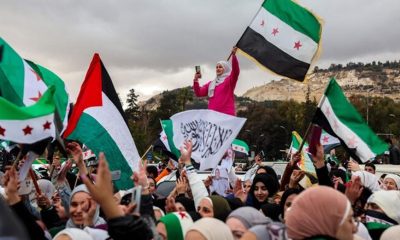
 International2 days ago
International2 days agoBashar Assad relatives arrested while trying to fly out of Lebanon
-
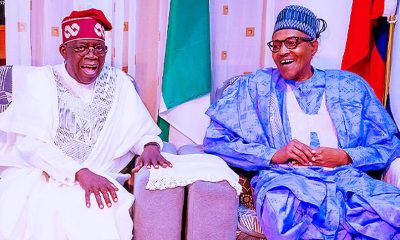
 Opinion3 days ago
Opinion3 days agoTinubu’s Buharization of NNPC By Farooq Kperogi
-

 Politics1 day ago
Politics1 day agoGbajabiamila speaks on his rumoured Lagos governorship ambition
-

 metro2 days ago
metro2 days agoWe’re not aware of VeryDarkMan’s missing N180m — Police

